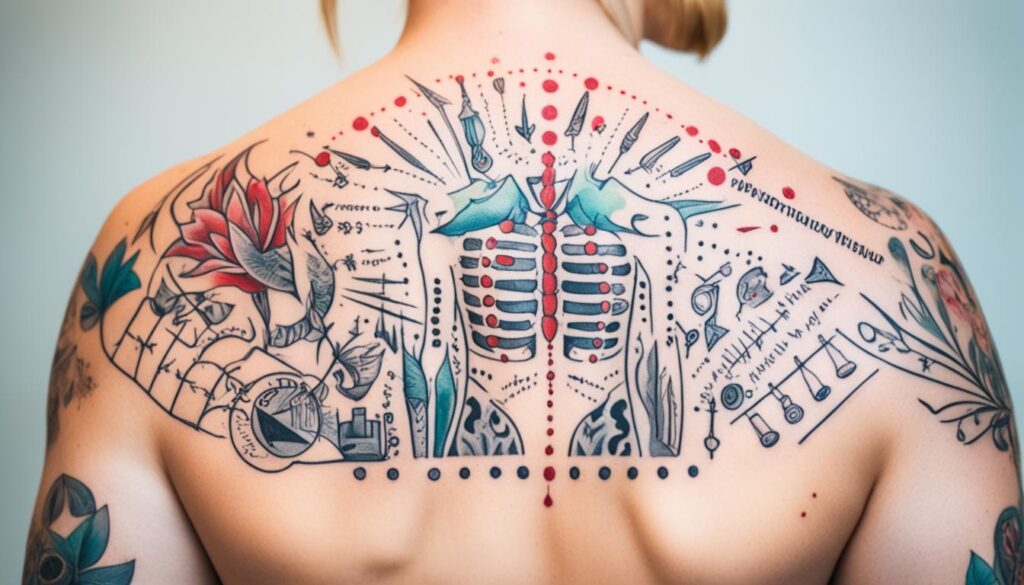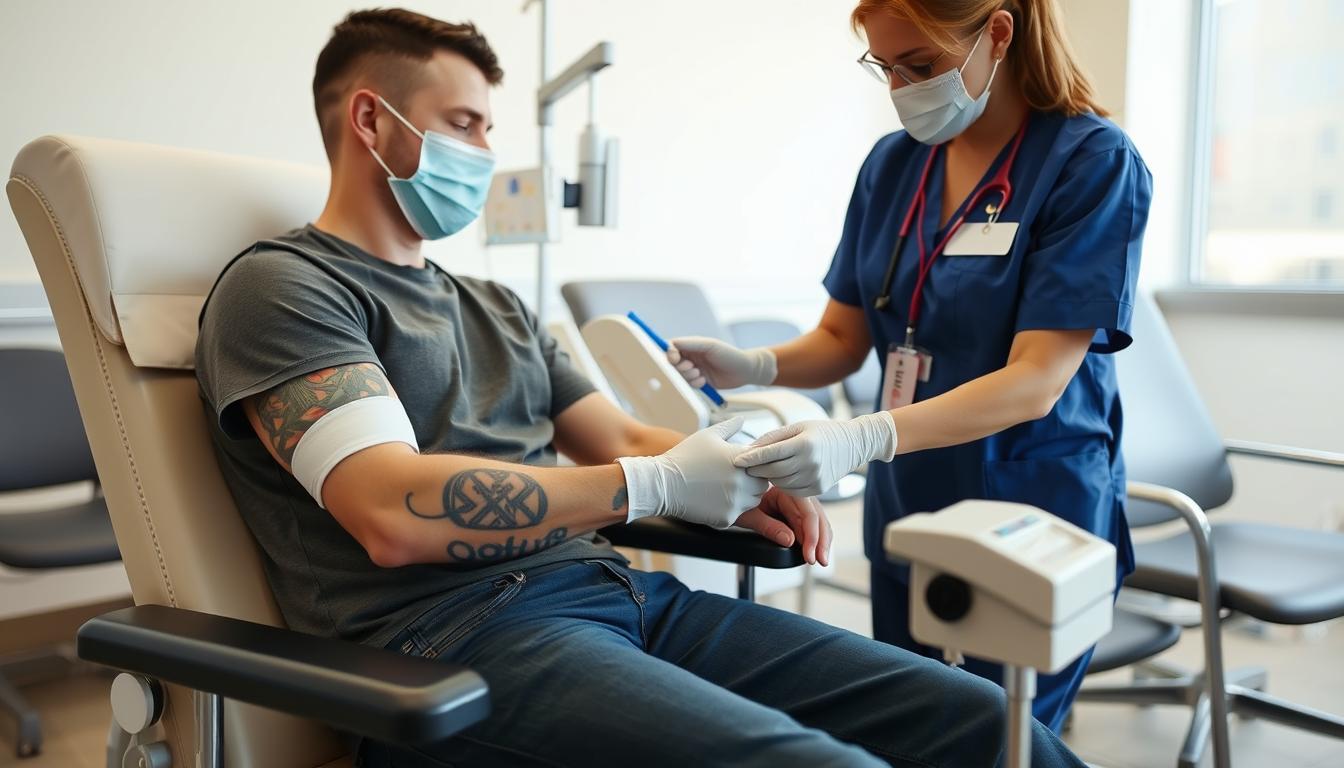If you have a tattoo, you may be wondering if you can still donate plasma. The answer to that question depends on a few factors, including how recently you got the tattoo and where it was done. In this article, we’ll explore the guidelines for plasma donation when it comes to tattoos and provide you with the information you need to know. can you Donate plasma with Tattoos?
Key Takeaways:
- Donating plasma with tattoos is possible, but there are eligibility criteria to consider.
- If your tattoo is less than 3 months old, you may need to wait before donating plasma.
- Tattoos done in licensed and regulated tattoo shops may have different guidelines.
- Certain medical conditions can make you permanently or temporarily ineligible to donate plasma.
- Finding a donation center is easy with organizations like the American Red Cross.
Eligibility Criteria for Donating Plasma with Tattoos
If you have tattoos and are considering donating plasma, it’s essential to understand the eligibility criteria. Here are the guidelines:
- If your tattoo is less than 3 months old, you may not be able to donate plasma. This waiting period allows time for the tattoo to properly heal and reduces the risk of infection.
- If you got your tattoo at a state-regulated tattoo shop with safe and sterile practices, you may be eligible to donate plasma in under 3 months. These regulated facilities adhere to strict hygiene standards, minimizing the risk of bloodborne conditions.
- However, if your tattoo was done at an unregulated facility or in certain states that don’t require tattoo shops to be regulated, you will typically need to wait 3 months before donating plasma. This precaution ensures that any potential risks of contamination are minimized.
- Similar rules apply to piercings. If your piercing is less than 3 months old, you may not be eligible to donate plasma. This waiting period allows for proper healing and reduces the risk of infection.
- State-regulated tattoo shops are required to meet safety and health standards to prevent contamination of blood with bloodborne conditions. Therefore, tattoos done at these facilities are generally considered lower risk when it comes to plasma donation eligibility.
If you’re unsure about your eligibility for plasma donation due to your tattoos, it’s advisable to consult with the donation center or medical professionals for more information.
Why Does the Age of the Tattoo Matter?
The waiting period of 3 months for tattoos is crucial because it allows the skin to fully heal and reduces the risk of infection or other complications associated with recent tattoos. During the healing process, the tattooed area goes through various stages, including scabbing and peeling. Donating plasma during this healing phase can potentially disrupt the healing process, leading to adverse health effects. Therefore, it’s vital to wait until the tattoo is fully healed and the skin has completely regenerated before considering plasma donation.
Ineligibility Factors for Donating Plasma

When considering donating plasma, it’s important to be aware of certain conditions that could make you ineligible. Some conditions result in permanent ineligibility, while others may lead to temporary ineligibility. Consulting with your doctor is crucial if you have any doubts about your eligibility to donate blood or plasma.
Permanent Ineligibility Conditions
- Hepatitis B and C infections
- HIV infection
- Chagas disease
- Other bloodborne infections
These conditions permanently disqualify individuals from donating blood or plasma due to the potential risks of transmitting these infections.
Temporary Ineligibility Conditions
- Cancer
- Heart conditions
- High or low blood pressure
- Recent surgeries
Temporary ineligibility may occur if you have had these conditions or procedures within a certain timeframe. The waiting period varies depending on the specific condition and the recommendation of your healthcare provider. During this temporary period, it may not be safe for you to donate plasma.
It’s crucial to remember that these eligibility guidelines are in place to ensure the safety of both the donor and the recipient of the donated plasma. By adhering to these guidelines, you can contribute to maintaining a safe and effective blood and plasma supply for those in need.
| Permanent Ineligibility | Temporary Ineligibility |
|---|---|
| Hepatitis B and C infections | Cancer |
| HIV infection | Heart conditions |
| Chagas disease | High or low blood pressure |
| Other bloodborne infections | Recent surgeries |
Minimum Requirements for Donating Plasma
In order to donate plasma, you must meet certain minimum requirements. These requirements are put in place to ensure the safety and well-being of both donors and recipients. Here are the key criteria that you need to fulfill:
- Age: You must be at least 17 years old to donate plasma. However, in some locations, individuals who are 16 years old can donate with parental consent.
- Weight: You must weigh at least 110 pounds (or 50 kilograms) to be eligible for plasma donation. This requirement helps to ensure that your body can handle the plasma extraction process without negatively impacting your health.
- Anemia: It is essential that you are not anemic when donating plasma. Anemia is a medical condition characterized by low levels of red blood cells or hemoglobin, which can affect your overall health and the quality of the donated plasma.
- Body Temperature: Your body temperature should not exceed 99.5°F (37.5°C) at the time of donation. Elevated body temperature can be an indication of an illness or infection, and it is important to protect both yourself and the recipients of the plasma donation.
It is also crucial to note other eligibility factors that may disqualify you from donating plasma. These factors include being pregnant, having certain medical conditions, or taking medications that interfere with the donation process. To ensure your eligibility and the safety of the donation, it’s always wise to consult with your healthcare provider if you have any doubts or concerns.
Donating plasma is a selfless act that can make a tremendous difference in the lives of others. By meeting the minimum requirements, you can contribute to the constant need for plasma in medical treatments and therapies.
Finding a Donation Center
When it comes to donating plasma, finding a convenient and reliable donation center is crucial. Fortunately, there are several organizations that provide plasma donation services across the United States.
One notable organization is the American Red Cross, which is renowned for its blood donation services. The American Red Cross operates walk-in donation centers in various locations, making it easier for individuals to donate plasma. Additionally, they also host mobile donation centers that travel to schools, organizations, and scheduled locations, providing convenient opportunities for plasma donation.
To locate a plasma donation center near you, simply search online for organizations like the American Red Cross and America’s Blood Centers. These platforms often have resources and directories that can help you find the nearest plasma donation centers in your area.
Hosting Your Own Blood Donation Drive
If you’re passionate about making a difference and want to take your involvement a step further, consider hosting your own blood donation drive through the American Red Cross. This initiative allows you to bring the donation center to your community or workplace, making it accessible for others to contribute to this noble cause.
By hosting a blood donation drive, you can help raise awareness and encourage others to donate plasma. The American Red Cross website provides all the necessary resources and information to support you throughout the process, making it a seamless and impactful endeavor.
Preparing for and After Plasma Donation
Before donating plasma, it’s crucial to take some steps to ensure your body is prepared. Follow these tips to make your donation process go smoothly:
- Wait at least 8 weeks after your last donation before donating again. This waiting period allows your body to replenish the plasma and essential nutrients necessary for optimal health.
- Stay hydrated by drinking at least 16 ounces of water or juice before your donation. Proper hydration helps ensure a successful donation process.
- Follow an iron-rich diet leading up to your donation. Foods such as lean meats, leafy greens, and fortified cereals can help maintain healthy iron levels, which are essential for the production of healthy blood cells.
- Avoid high-fat meals before your donation. Consuming excessive amounts of fatty foods can affect the quality of your plasma, making it unsuitable for use.
- Avoid aspirin if you plan to donate platelets. Aspirin might affect the clotting ability of your platelets, making them less effective for those in need.
After donating plasma, it’s important to take care of yourself. Here are some post-donation instructions to follow:
- Have extra fluids after your donation to help replenish your body’s fluids and promote a faster recovery. Drink plenty of water or clear fluids to stay hydrated.
- Avoid alcohol for 24 hours following your donation. Alcohol can dehydrate your body and interfere with the healing process.
- Keep the bandage on for a few hours to protect the donation site. This will help prevent bleeding and reduce the risk of infection.
- Avoid strenuous physical activity until the next day to allow your body to recover fully. Excessive exercise or heavy lifting can cause dizziness or fatigue after donation.
Follow these pre and post-donation guidelines to ensure a smooth and successful plasma donation process. Remember, your contribution can make a significant difference in the lives of those in need.
Conclusion
Donating plasma with tattoos is possible if you meet the eligibility criteria and adhere to the required waiting periods. It’s important to ensure that your tattoo was done in a licensed and regulated tattoo shop to minimize the risk of infection. Always consult with your doctor if you have any doubts about your eligibility.
By donating plasma, you can make a valuable contribution to those in need. Consider booking a donation appointment if you meet the eligibility requirements. Your donation can help save lives and make a positive impact on the community.
Remember, getting a tattoo doesn’t automatically disqualify you from donating plasma. As long as you follow the necessary guidelines and take proper precautions, you can still make a difference through plasma donation.
FAQ
Can you Donate plasma with Tattoos?
What if my tattoo was done at an unregulated facility or in certain states that don’t require regulation?
Are there any restrictions for body piercings and plasma donation?
What are the eligibility factors for blood and plasma donation?
What are some conditions that may make me permanently ineligible to donate blood or plasma?
Are there any temporary ineligibility factors for donating plasma?
How can I find a plasma donation center near me?
What should I do to prepare my body for plasma donation?
What should I do after donating plasma?
Can I still donate plasma if I have a tattoo?
Forhad
Forhad's writing is not just about the artistry of tattoos or the latest trends in the industry; it's an exploration of the deep-rooted connections people have with their tattoos, reflecting personal narratives, cultural histories, and moments of transformation. Through a mix of in-depth features, personal narratives, and insightful analyses, he sheds light on the multifaceted nature of tattooing, revealing the emotional and cultural layers that lie beneath the surface.











